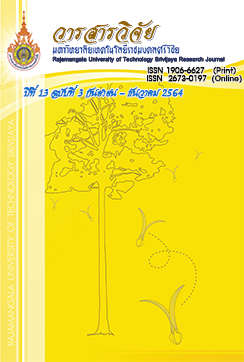An Integrated Fluidized Bed Bioreactor (iFBBR) by Mathematical Models
คำสำคัญ:
เครื่องปฏิกรณ์ชีวภาพแบบฟลูอิไดซ์เบดกับถ่านกัมมันต์แบบเม็ดในอุดมคติ, การพัฒนาแบบจำลองทางคณิตศาสตร์, ถังปฏิกรณ์แบบไหลเวียน, ถ่านกัมมันต์แบบเม็ด, น้ำเสียบทคัดย่อ
งานวิจัยนี้มีจุดมุ่งหมายเพื่อการร่วมเครื่องปฏิกรณ์กวนชีวภาพแบบฟลูอิไดซ์เบด (Integrated Fluidized Bed Bioreactor; iFBBR) ซึ่งระบบการทำงานนั้นจะทำงานร่วมกับบ่อเติมอากาศและถังทรายกรอง ในการเพิ่มประสิทธิภาพ การกำจัดสารอินทรีย์ได้รับการพัฒนาโดยใช้แบบจำลองทางคณิตศาสตร์ของเครื่องปฏิกรณ์แบบท่อไหลเวียน (RPFR) และเครื่องปฏิกรณ์ถังกวนแบบกวนผสมไหลเวียน (RCSTR) การประเมินและทำนายประสิทธิภาพการบำบัดน้ำเสียนั้นใช้เครื่องปฏิกรณ์ชีวภาพแบบฟลูอิไดซ์เบดกับถ่านกัมมันต์แบบเม็ด (FBBR-GAC) และบ่อเติมอากาศ จากการศึกษาครั้งนี้ได้นำน้ำเสียชุมชนโดยใช้ค่า BOD ในการทดสอบกับแบบจำลอง RPFR และ RCSTR ที่พัฒนาขึ้นพบว่าอัตราการหมุนเวียนที่เหมาะสม (R) มีค่าเท่ากับ 936 และอัตราความเร็วที่เหมาะสมของเครื่องกวน (NB) คือ 26 รอบต่อนาที เกิดปฏิกิริยาแบบจำลองจลน์อันดับที่ 2 (k2nd) ของเครื่องปฏิกรณ์ FBBR-GAC และบ่อเติมอากาศโดยมีค่า k2nd ของ RPFR และ RCSTR เท่ากับ 1.543 และ 14 602 day-1 จากการเปรียบเทียบประสิทธิภาพของการกำจัด BOD ระหว่างเครื่องปฏิกรณ์ชีวภาพแบบฟลูอิไดซ์เบดกับถ่านกัมมันต์แบบเม็ด (FBBR-GAC) และ การร่วมเครื่องปฏิกรณ์ชีวภาพแบบฟลูอิไดซ์เบด (iFBBR) เพิ่มขึ้นจาก 83.64% เป็น 95.46% ใช้เวลาการหมุนเวียน (HReT) 0.0417 วัน ทั้งสองรุ่นมีความสำคัญต่อการออกแบบระบบบำบัดน้ำเสียในพื้นที่ชุ่มน้ำที่สร้างขึ้น
เอกสารอ้างอิง
Benefield, C.W. 1980. Randall. Biological process design for wastewater treatment. Englewood Cliffs, Prentice Hall, New Jersey.
Fernandez, N., Montalvo, S., Guerrero, L., Sanchez, E., Cortes, I. and Travieso, L. 2007. Anaerobic fluidized bed reactor application to tropical fruit wine effluent. Water Science and Technology 56: 33-38.
Kadlec, R.H. 2009. Comparison of free water and horizontal subsurface treatment wetlands. Ecological Engineering 35: 159-174.
Lohi, A., Cuenca, M.A., Anania, G., Upreti, S.R. and Wan, L. 2008. Biodegradation of diesel fuel-contaminated wastewater using a three-phase fluidized bed reactor. Journal of Hazardous Materials 154(1-3): 105-111.
Patel, A., Zhu, J. and Nakahla, G. 2006. Simultaneous carbon, nitrogen and phosphorous removal from municipal wastewater in a circulating fluidized bed bioreactor. Chemosphere 65: 1103-1112.
Qasim, S.R., Motley, E.M. and Zhu, G. 2000. Water Works Engineering: Planning, Design and Operation. Upper Saddle River, Prentice Hall, New Jersey.
Reynolds, T.D. 1982. Solutions Manual for Unit Operations and Processes in Environmental Engineering. Brooks/Cole Engineering Division, Monterey, Calif.
Saravanane, R. and Murthy, D.V.S. 2000. Application of anaerobic fluidized bed reactors in wastewater treatment: A review. Environmental Management and Health 11: 97-117.
Suksomboon, R, and Junsiri, C. 2018. The performance of moving fluidized bed bioreactor-granular activated carbon, MFBBR- GAC. Prawarun Agriculture Journal 15(1): 238-247. (in Thai)
Suksomboon, R., Junsiri, C., Saikaew, W. and Kanyakam, S. 2019a. Mathematical Modeling of Moving Fluidized Bed Bioreactor - Granular Activated Carbon, MFBBR- GAC Domestic Wastewater Treatment for Agricultural Use. Prawarun Agriculture Journal 16: 259-269. (in Thai)
Suksomboon, R., Junsiri, C., Tangjitjaroenkit, S., Moselhy, M. and Padungthon, P. 2019b. Mathematical models of a fluidized bed bioreactor using granular activated carbon (FBBR-GAC) for wastewater treatment. Engineering and Applied Science Research 46(3): 183-191.
Tchobanoglous, G. and Schroeder, E.D. 1985. Water Quality: Characteristics, Modeling, Modification. Addison-Wesley, Boston.
Xing, W., Ngo, H., Guo, W., Yang, N. 2010. Enhancement of the performance of anaerobic fluidized bed bioreactors (AFBBRs) by a new starch-based flocculant. Separation and Purification Technology 72(2): 140-146.
Yu, P. and Luo, Y. 2002. Noval water treatment process-combined cationic ionexchange bed and degasifier in a three-phase fluidized bed. Desalination 151: 145-152.
ดาวน์โหลด
เผยแพร่แล้ว
รูปแบบการอ้างอิง
ฉบับ
ประเภทบทความ
สัญญาอนุญาต
เนื้อหาและข้อมูลในบทความที่ลงตีพิมพ์ในวารสารวิจัยมหาวิทยาลัยเทคโนโลยีราชมงคลศรีวิชัย ถือเป็นข้อคิดเห็นและความรับผิดชอบของผู้เขียนบทความโดยตรง ซึ่งกองบรรณาธิการวารสารไม่จำเป็น ต้องเห็นด้วย หรือร่วมรับผิดชอบใดๆ
บทความ ข้อมูล เนื้อหา รูปภาพฯลฯ ที่ได้รับการตีพิมพ์ในวารสารวิจัย มหาวิทยาลัยเทคโนโลยีราชมงคลศรีวิชัย ถือเป็นลิขสิทธ์ของวารสารวิจัย มหาวิทยาลัยเทคโนโลยีราชมงคลศรีวิชัย หากบุคคลหรือหน่วยงานใดต้องการนำทั้งหมดหรือส่วนหนึ่งส่วนใดไปเผยแพร่ต่อหรือเพื่อการกระทำการใดๆจะต้องได้รับอนุญาตเป็นลายลักษ์อักษรจากวารสาร มหาวิทยาลัยเทคโนโลยีราชมงคลศรีวิชัยก่อนเท่านั้น







